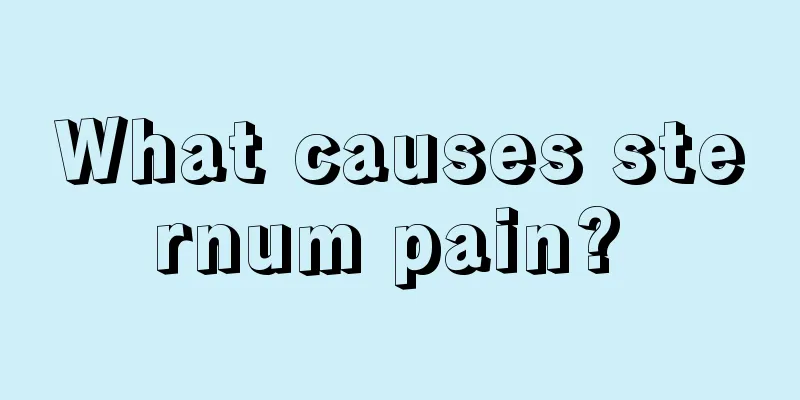What to do about lumbar degenerative changes? Treat it with traditional Chinese medicine

|
Lumbar degenerative changes are a symptom that occurs with age. Patients will experience low back pain and numbness and pain in the lower limbs. Low back pain can be treated with medication, but if the numbness and pain in the lower limbs is severe, patients must take it seriously and choose surgical treatment based on the situation. 1. Treatment for low back pain can generally be divided into drug therapy, rehabilitation therapy, etc. Commonly used drugs include non-steroidal anti-inflammatory drugs, opioid analgesics, antidepressants and muscle relaxants. The first two types of drugs can effectively relieve symptoms in the short term, while the effects of antidepressants and muscle relaxants are not very obvious. Clinically used to treat osteoarthritis in various parts of the body, these chondroprotective agents have a certain degree of anti-inflammatory and anti-cartilage decomposition effects. Functional exercise, back muscle training and other rehabilitation treatments are effective and can not only relieve pain but also promote functional recovery. 2. Patients with numbness and pain in the lower limbs, intermittent claudication, and especially urinary and bowel problems should be paid attention to, because the above symptoms indicate nerve compression. Bed rest, symptomatic pain relief, and nerve nutrition are the most basic treatment measures and should not be ignored. Patients with severe symptoms, especially those with urinary and bowel problems or foot drop (weakness in hooking or curling the instep), should undergo surgery as soon as possible. The main purpose of the surgery is to decompress the nerves and relieve symptoms by removing part of the vertebral lamina and intervertebral disc. In some cases, after removing the compression object, internal fixation is required at the surgical segment to restore the stability and alignment of the local lumbar spine. In recent years, various minimally invasive spinal surgical techniques have emerged, mainly including small channel spinal surgery and interventional surgery. The former is similar to traditional surgery, but is completed through small incisions and special small channels; the latter mainly uses guide needles to penetrate the intervertebral disc, and achieves decompression by injecting special drugs or taking radiofrequency ablation. 3. Clinical manifestations 1. Low back pain and decreased lumbar support function This type of symptoms is mostly caused by degeneration of the intervertebral disc, wear and hyperplasia of the lumbar facet joints, lumbar scoliosis, lumbar spondylolisthesis, etc., and is characterized by worsening after standing fatigue and relief after bed rest. 2. Lower limb pain and numbness, intermittent claudication This type of symptom is mainly related to intervertebral disc herniation, osteophyte hyperplasia or spinal canal stenosis compressing the nerves and affecting the nerve blood supply. The leg pain caused by typical lumbar disease is often manifested as sciatica, that is, pain starting from the waist or buttocks, radiating from the back of the thigh and the outside of the calf to the foot. The main symptom of intermittent claudication is that after walking a certain distance (usually as the disease worsens, the walking distance gradually shortens), the lower limbs experience soreness, numbness, swelling and pain, as if filled with lead, making it difficult to walk. At this time, the symptoms can be relieved after bending over, sitting down or squatting to rest for a while, but they will worsen again after starting to walk. 3. Urinary and sexual dysfunction This type of symptoms may manifest as weak defecation and urination, incomplete defecation, urinary retention, decreased sexual sensitivity, impotence, abnormal erection, etc. Male urinary problems are sometimes difficult to distinguish from prostate hyperplasia. Some scholars believe that male urinary problems caused by lumbar spine diseases are often mild or severe, while the severity of urinary symptoms caused by prostate diseases is relatively constant. |
<<: Lumbar disc herniation bone setting, these methods are used to treat
>>: What to do if you have bad breath due to stomach inflammation? These four points can help you
Recommend
Is a brain septum pellucidum cyst dangerous?
We all know that diseases that generally occur in...
Will colon cancer recur after five years?
Will colon cancer recur after five years? Relevan...
Why does osteoporosis occur? What are the causes?
Osteoporosis is indeed a common problem among peo...
What should we pay attention to regarding the harmful effects of smoking on health?
In real life, many people have the bad habit of s...
Treatment of Cryptococcal Infection
In addition to general treatment and care, crypto...
What are the benefits of using grapefruit peel to wash your hair
Grapefruit peel is rich in essential oils. Pour i...
Examination for endometrial cancer
How is endometrial cancer detected? Endometrial c...
Some surgical treatments for laryngeal cancer
There are several surgical treatments for larynge...
Treatment of seborrheic alopecia areata, external treatment is the most common
Alopecia areata is a sudden hair loss phenomenon ...
What are the symptoms of hydronephrosis
Hydronephrosis can easily cause urinary tract obs...
Can colorectal cancer be eradicated by taking Chinese medicine?
Can taking Chinese medicine cure colorectal cance...
How to shave armpit hair cleanly
Everyone will grow armpit hair. Armpit hair grows...
How to treat dull yellow skin all over the body
The color of human skin is different for each per...
How to store milk powder after opening
For infants and young children, parents will buy ...
What is the difference between lumbar disc bulging and protrusion
Lumbar disc herniation and bulging are both very ...









